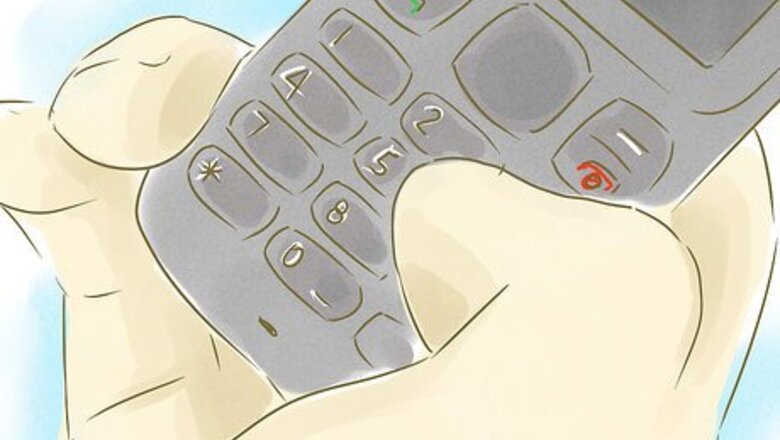
views
Avoiding Contact With Your Ex
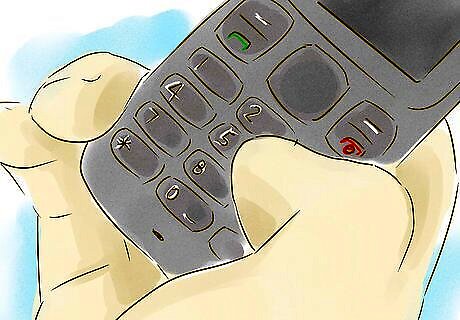
Delete your ex's phone number from your contacts list. Some people reach out to their exes in a moment of weakness, while others do so in hopes of reigniting some romantic interest. However, any attempts at contacting your ex will only dredge up painful feelings for one or both of you, and it will only prolong the inevitable. Remember that you broke up for a reason: one or both of you were fundamentally unhappy, and that won't change. If your ex's phone number was saved on your cellphone, delete his/her contact information and delete any previous text message conversations or phone call records on your phone. Erase, blot out, or discard any physical copies you've written down of your ex's phone number (like from an address book, for example). Consider blocking your ex from contacting you on your cellphone. Generally this is done by going into settings, clicking on privacy, and blocking the number of your ex, though the exact method will vary depending on the type of phone you have. Turn off your phone any time you plan on drinking alcohol (if you meet legal drinking age) so that you do not text or call your ex in a moment of weakness.
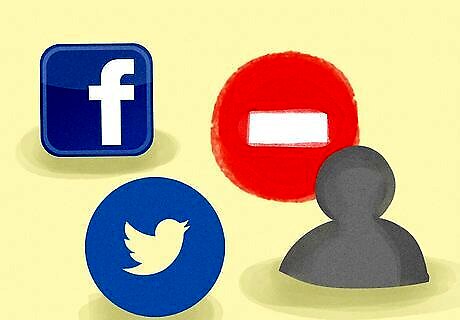
Unfriend or unfollow your ex on social media. Some people are able to remain friends with an ex. However, if you don't think you can be friends without having romantic feelings for him/her, it may be best to cut off all ties with that individual. Even if you've deleted your ex's phone number, you may still be able to send your ex private messages or comment on photos and status updates. Unfriending/unfollowing your ex on social media will help remove temptation to contact that individual. It can also provide you with space and privacy while you heal from the breakup. Remember that if you remain friends on social media, you'll have to see whom that individual is in a relationship with in the future. You'll also be generally reminded of your time together, which may create feelings of longing. Remember that you can always send your ex a friend request or follow him/her in the future, once you've gotten over the breakup. If you're feeling vulnerable and may try to contact your ex, though, it's best to cut that individual out altogether for the time being. Reader Poll: We asked 241 wikiHow readers about how they use social media after a breakup, and 51% of them said that they block their ex and make their profile private. [Take Poll]

Distance yourself from mutual friends for a while. You may not need to do this, but some people may find it helpful to create some distance between mutual friends while the breakup is still fresh. If you think you might be tempted to ask a mutual friend to "report" on your ex, or if you cannot separate the emotional associations of your ex with your mutual friends, it may be best to create a little space until you've healed and moved on. Let your friends know what you're doing and why. If you don't communicate with them, they may worry that you've decided not to be friends with them as individuals. If your mutual friends bring up your ex around you, ask them to stop doing so, at least until you've healed from the breakup. Avoid any situations or social events where your ex may be present. For example, if your mutual friends host a party or invite you to an event, ask them in advance whether your ex will be there.
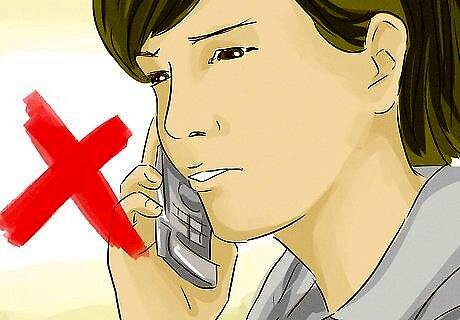
Try to find a sense of closure. The best way to heal yourself emotionally after a breakup is by accepting that the relationship is over. This may be difficult, especially if you were the rejected partner, but recognizing that it could never work out is important. Until you have found some sense of closure, you may continue to feel temptations to call or text your ex, and doing so will only prolong the suffering and emotional vulnerability you're feeling. It's okay to feel pain and sadness - these feelings are normal. But dwelling on those feelings or convincing yourself that you've lost your "one true love" will only delay your healing. Recognize that it's okay to be alone for a while. You can find other exciting ways to fill your time, and once you've taken time for yourself you'll be ready to begin an even better relationship with someone new. If you're still thinking fondly about your ex or hoping for some type of reconnection, you haven't found closure yet. It's vital that you avoid contacting, seeing, or even accidentally running into your ex during this time in order to heal and move on.
Getting Over the Breakup

Spend as much time as possible with friends and family. If you're coming out of a long-term relationship, especially with someone you shared a house or apartment with, being alone may feel scary or intimidating. The best way to get over your ex (and distract yourself from any temptation to call him/her) is to be around other people as often as you can. Reach out to friends and family members, even if you haven't seen them or heard from them in a while. It's okay if you have to initiate the planning; the important thing is not to be alone. Try taking up a new hobby or enrolling in a class, and ask a friend to try it out with you. This can be a great distraction from your feelings and a good bonding experience between you and your friend.

Put away or get rid of sentimental reminders. After a long relationship, you probably have a lot of physical objects that remind you of your ex. These may be little gifts and shared objects, and seeing them everyday can be a constant reminder of your past relationship. Getting rid of (or at least hiding) these objects that remind you of your ex can help you feel less compelled to contact your ex in the wake of a breakup. Box up anything that reminds you of the other person. Whether it's photographs, gifts, or belongings that he/she left behind, it's best to keep them out of sight. If you can't keep these sentimental reminders in your home without dwelling on your ex or feeling tempted to contact him/her, throw them in the trash. Just be sure to arrange for a mutual friend to return any belongings that your ex may want back before you throw anything out.

Change your life to stop thinking about your ex. Sometimes moving on from a breakup can be difficult. Even after removing the sentimental reminders of your ex, you may find yourself thinking about him or her on a regular basis, and that may give you the urge to contact your ex. If you're having a hard time moving past the breakup, making some changes in your routine or your life in general may help. If you shared a house or apartment, move out and find a new place in a different neighborhood. If you work together or used to work together, consider looking for a new job. If you don't want to leave your job but you still work together and share space, ask your boss if you can change desks to be farther away from one another. Find other ways to change up your routine and your physical surroundings. Do whatever you can to make subtle changes in your life and erase all reminders of your ex.

Forgive yourself for any part you played in the breakup. Whether you were the person who initiated the breakup or your actions/behavior led to your ex breaking up with you, you may be carrying around some guilt. It's important to accept the past and move on in order to heal. Remember that no matter how guilty you may feel, your ex certainly played a role in things falling apart - and that's okay. Moving on means learning how to love yourself and forgive yourself for your mistakes. Eventually, once you've forgiven yourself, you may be able to forgive your ex as well.
Assessing Whether You Can Ever Be Friends With Your Ex

Consider whether your ex has hurt you. Every relationship has its ups and downs. Couples often fight, and sometimes things are said that shouldn't have been. However, if your partner has abused you (emotionally or physically), cheated on you, or otherwise neglected your feelings throughout the course of your relationship, there's a good chance that that individual would not make a good friend. Toxic people who have hurt you and may continue to do so in the future should be cut out of your life. This is best for your getting over that ex as well as for your general mental health and wellbeing.

Ask yourself whether you could be friends without wanting a relationship. Some people never stop feeling some type of attraction towards another person. That attraction may be physical or emotional, but it can make friendship very difficult. If you don't think you can talk to your ex or be in the same room with him or her without wanting to reconnect on some level, you'll need to accept the fact that you just can't maintain a friendship with that individual. If you're having trouble moving on, make sure you cut off all ties completely and at once. Any time you catch yourself thinking about your ex, make a point of doing something fun and distracting. Go out with friends, watch TV, or find other ways to snap out of that mindset.

Assess how much time has passed. Being friends after a breakup almost always requires time and distance apart. You cannot transition from a relationship to a friendship without time to process and heal (if you're able to at all). If you think you can get over the breakup and ultimately become friends with your ex, you'll need to evaluate your feelings towards that person and consider how much time has passed since the breakup. Most people feel sad, lonely, or hurt/betrayed in the wake of a breakup. This is normal, and these feelings will pass with time. There is no universal waiting period for getting over a relationship. For some people it can happen in a week or two, while for others it may take months to get over an ex. If you still feel any kind of longing or resentment towards your ex, not enough time has passed. Once you can think about your ex and not miss him/her or get angry about the breakup, you may be ready to consider transitioning to a friendship. If this doesn't happen, though, you may need to cut your losses and move on without your ex in your life.


















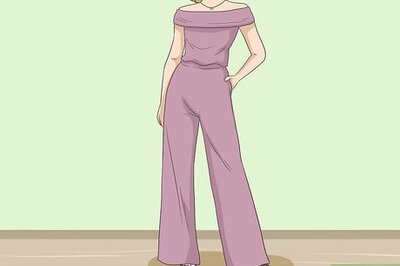

Comments
0 comment